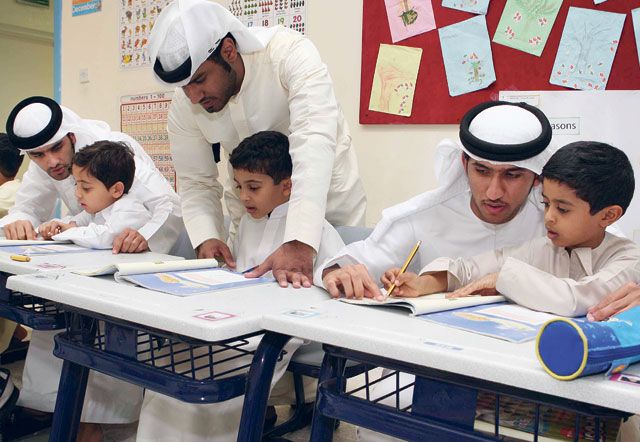Abdul Rahman Ali Al Attas is one of only six male students at his college pursuing a Bachelor of Education (BEd). The Emirates College for Advanced Education (ECAE) in Abu Dhabi has a student population of 220. Of this number 95 per cent is female. In some ways this makes Al Attas and his peers pioneers in their own right.
According to Al Attas, teachers are the first block of development. He said: "It is a teacher who creates doctors and engineers because they stem from branches of teaching."
However, colleges nationwide are struggling to fill teaching programmes as a majority of Emirati students opt out of, rather than into, the teaching profession.
Dwindling numbers
In his second year of study Al Attas recalls when he first joined the programme in 2007. "When we started in our foundation year there were 14 males and then they started to decrease." He went on to explain how some of his fellow Emiratis failed courses and others left to join the police force or military. "Now we are six and if we lose one it will feel like we've lost a limb."
He explained the pressures boys face to stay in college while offers poured in to join the public sector. "It was our teachers who helped us stay in school," he said.
Trauma
Similarly Dubai Women's College (DWC) struggles to recruit students to its education programme. With a student body of over 2,000, only a mere 42 are enrolled for the B.Ed programme. Superviser of the Education Programme Ian Boulter said although the programme seems to be more successful on Higher Colleges of Technology campuses in other emirates, the case for DWC might be a lack of awareness or too much choice. "There are a lot of other opportunities for students that may seem more attractive than the teaching profession."
He said a majority of children going through the public school system do not have a particularly uplifting experience. "The schools are not providing the kind of model to encourage people to join the profession," he said.
Shaikha Al Qassab who is in her third year of an education degree at DWC agreed. She said among her peers there is a stereotype that classes are boring and teachers shout at students. She said this mentality deters high school graduates from pursuing the profession.
Lack of jobs
Also in her third year at DWC, Amal Al Falasi chose to study education to "change the traditional way of teaching". But she fears she will struggle to find a job after graduation as some of her peers who graduated over three years ago are still unemployed.
Shaikha added that there is a lack of support from the Ministry of Education. "When we are qualified teachers but don't have the support then what's the point?" she said.
She said this affects the recruitment of students into education courses as they view the career as an impossible challenge. "We have talented girls ... who tend to leave the education sector," said Boulter.
Cultural issues
"There are 140,000 children studying at private schools in the UAE" said Ian Haslam, vice-chancellor of ECAE. "Only 20 per cent of those students are Emiratis."
He said that more than 18,000 teachers work in Abu Dhabi to teach Emiratis in private or government schools. His point illustrates the demand for educators in the schooling market.
The Magrudy's Educational Resource Centre (MERC) has been in partnership with the University of Sunderland from the UK for just over a decade. Offering a Postgraduate Certificate of Education (PGCE) to trained teachers or graduates interested in pursuing teaching, the centre too struggles to recruit Emiratis into the course. "We don't have many Emiratis in the programme although we very much welcome them to work in international schools," said Sue Cooke, university programme leader.
Although this may be the case, Emirati females are reluctant to look for jobs in private schools. "Private schools may not culturally suit my personality or beliefs," said Shaikha. She said working in an environment surrounded by females would enable her to be more productive.
Revamp needed
Cooke went on to speak of her decade-long experience of schooling in the UAE. She said some systems of education are built on the premise of little interaction. The method is to deliver information to students and expect them to reiterate it when required as opposed to the western style of education that encourages students to get involved and question. She said this seems to be the case with the Arabic and Indian education systems among others.
However, she said although the UAE is trying to bring about education reform the results will not be immediate. "The bones of the system need to be set in place at the beginning," said Crookes referring to elementary education. "However the effects of the change will only be visible when students finish secondary school."
She said that if a long-term requirement is for Emiratis to contribute to the infrastructure of their country then education is one of the ways to do it. "We need Emiratis on a programme which opens them up to a western style of education so they can then put it back into the schools."



